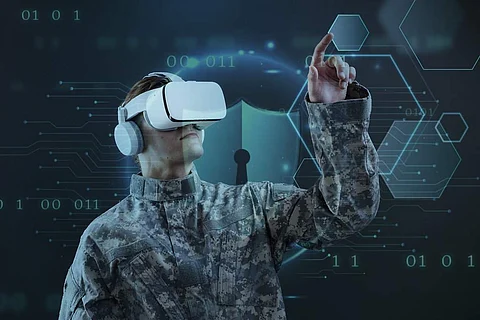

The internet, ever since its inception in the last century, has been evolving and being made to evolve in a way to keep giving more to the people. We all know the ocean worth of information it provides, which is just one facet of the internet. But what about the side of it that aspires to create an experience that is a new world in its own right? The cyberspace is where the new-age action is happening already. We all are familiar with the word 'metaverse' and the world that is created by wearing cool VR glasses. But could it really have applications in the real world that allows us to have an even more acute sense of learning and communication? We spoke to some experts from various sectors to know more about how it could have an impact on our lives, especially in the education sector.
Manav Subodh, Co-founder of 1M1B Foundation, speaks at length about what this revolutionary technology could mean for the education sector. He says, "Metaverse is an immersive 3D experience in which you feel as if you are part of another world that duplicates the real world. This is enabled with a VR headset that will, in the coming days, revolutionise the education sector and even our retail shopping experiences. What I am really excited about it is the potential in education, especially the skilling of people. Immersive learning is achievable using the metaverse. This would really make it possible to have learning that is experiential, which we have been trying for over two decades now. The very fact that it does not require any physical infrastructure would be a solution for a lot of places where it is difficult to provide. A student can be introduced to science at a very early age because it provides the safety of a virtual space. Even the most expensive equipment can be reproduced on the metaverse and thus, removing the obstacle of accessibility to a great accent."
A curious point that he makes is that of ethics among netizens. "One thing that would be important when metaverse becomes somewhat mainstream is the issue of ethics. The way a person conducts oneself will be scrutinised just like we are in the real world. People would be expected to present themselves in a civilised way and this would be very normative," says Manav.
Manav feels that the true and obvious obstacle lies in making metaverse technology affordable to the larger society. "The real challenge and opportunity, I believe, lies in universalising metaverse technologies. Right now, only a few elite schools in the country have access to it. Once it spreads, the teachers would need to equip themselves with the know-how to make their respective subjects and syllabi more interesting for the students," Manav says.
The idea that metaverse would create a new market space for creators and developers is also not lost on Manav. He says, "Another area that will get developed is the creator space. Metaverse would provide ample chances for people to create content for people's consumption and there's no doubt that it will help raise the monetary value as well."
Archana Surana, Founder and Director of Arch College of Design and Business, feels that the metaverse would be a revolutionary development in communication, even more so than in education. "I feel more than learning through a new mechanism, the real potential lies in having a new and revolutionary way to communicate with others. Beyond that, it would also take a lot of time for creators to make content available for the wider masses. We saw how the internet took almost three decades to become this ubiquitous. So the metaverse would also take its own time to reach people," she says.
Speaking about the issue of privacy in the metaverse, Archana says that there would be little difference compared to the existing problems. "We will have to make clear choices when it comes to personal privacy in the metaverse. It has been a problem with the world of the internet and we have almost become accustomed to being in a vicious cycle of creating solutions and problems, one after the other," she adds.
She talks about a key advantage that metaverse could hold over its contemporary technologies. "One particular merit of metaverse could be that it might solve the issue of attention span and focus among learners and people in general. We see today that people do not engage in an activity for a prolonged period of time because there are so many distractions, not least of which is the mobile phone. The metaverse could create an immersive experience where people have no choice but to participate with all their attention. They would have to adhere to the group etiquette while communicating with others, such as a metaverse classroom," says Archana.
Speaking on how the metaverse would be an improvement over online teaching, Girish Singhania, Founder and CEO of EduBridge Learning, says "The metaverse has the potential to address two key deficits in online learning as it is currently practised. Firstly, learning from one's peers can be enabled just like in a classroom environment. This is completely absent in on-screen learning. Secondly, students can pick up on softer aspects of classroom teaching like inherent traits, mannerisms and soft skills which are not consciously taught. This is reduced to a great extent in online learning today. Being a 3D digital projection would also mean that people can learn by doing in a much better way. However, the drawback of not being able to replicate the bond that people have in physical meetings will remain."
